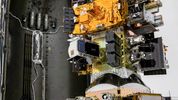Great article in the Economist about drones in a box. We at the Seraphim Space Fund see a huge amount of investment activity in this area. We're particularly drawn to autonomous models such as Nightingale Security. They use drones to replace physical security guards, fully autonomous 24/7 equipped with real-time aerial surveillance cameras and data gathering sensors including facial recognition and infra-red. The Nightingale drones automatically return to their box on the roof of a building once their 'shift' is over (to recharge on doughnuts and coffee).
Most existing drones need to be flown by an experienced operator. Indeed, the law often requires this. Drones also need technical support and maintenance. And the people operating them would be well advised to have an understanding of the legal and safety implications of what they are up to. Hence the appeal of the “drone-in-a-box”. The box in question is a base station that houses the drone, recharges it and transfers the data it has collected to the customer. The drone may fly autonomously, according to a preprogrammed schedule, find its way automatically to a point it is ordered to visit, or be piloted remotely by an operative of the company that supplies the system, from a control centre anywhere on the planet











